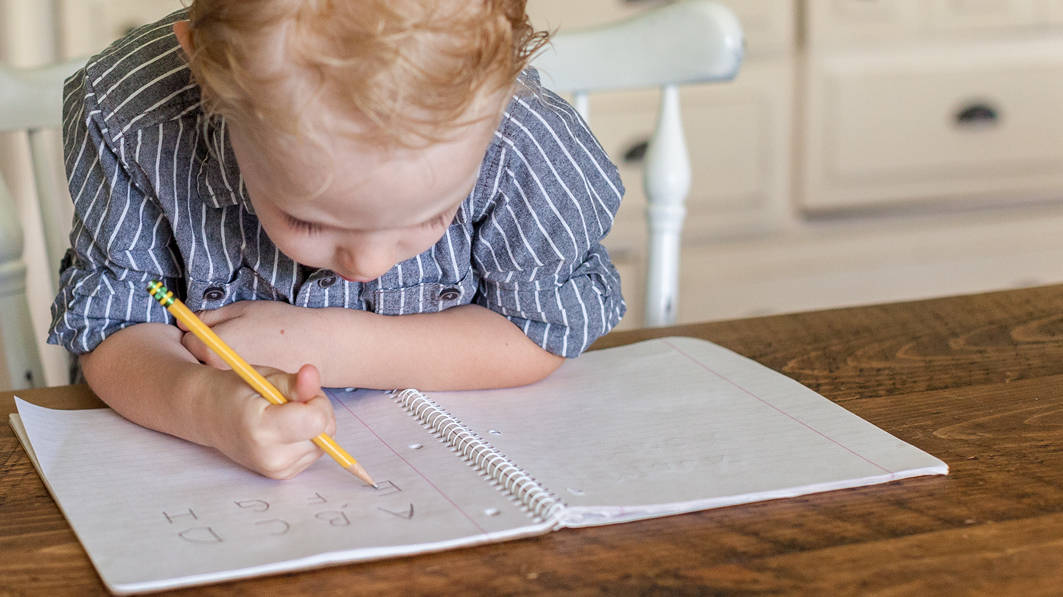Getting kids to practice or complete schoolwork and projects can be a homework battle, full of tension. As a parent, what can you do . . . and what should you do . . . or not do? Here are ways other parents have encouraged academic skills, have come alongside their children, or have released the schoolwork and deadlines to their kids.
Triple Power Test Prep
First, I wrote each term on separate notecards in different-colored markers. The color association helped them picture and remember the word and corresponding definition.
Then, for the Scientific Method notecard, I created an acrostic, each letter representing one of the six steps.
Next, I hooked up a small basketball hoop to the playroom door for a game of “study basketball.” I quizzed my kids on the science terms, and if they answered correctly, they scored a point and attempted to shoot the ball into the basket for an extra point.
Not only were my children prepared for their test, but they also enjoyed the process.
—Linsey Driskill
Studying Without Distractions
I have three children (ages 9, 5 and 1). Life can get noisy, so we try to keep distractions to a minimum when my oldest child is doing her homework. So my 5-year-old and I might do the dishes, fold laundry or tidy the house together, with my 1-year-old in tow. For us, the key is to keep the TV off and avoid engaging in loud activities.
This allows my 9-year-old to complete her homework quicker and with fewer mistakes.
—Marissa Andrick
Reading Exercises
Home-schooling rambunctious boys on rainy days can be challenging. To help them, we read our lessons on the floor in the planking position (only our forearms and toes touch the ground) for as long as we can hold ourselves up. Then after we’ve read a few pages, we take a break and do 10 pushups. These exercises help my sons focus on their school lessons.
—Evie Palmer
Running Through Homework
After a long day of school, getting my kids to sit down to complete homework is nearly impossible. They want to be moving. So I have my kids tackle shorter tasks, like a few math problems or a page of reading, and then run a lap around the house. It allows them to complete their work while getting their energy out. They are so excited for their next lap around the house that they focus better on each task.
—Alicia Gorski
Find ways to make learning more active
One fun way I found to help my kids when they struggled in memorizing math facts was to tape flash cards on the floor. Then I have them hop onto each card as they gave the answer to that flash card.
For example, I would tape multiplication facts about one foot apart. If they said the next equation with the correct answer, they could jump onto that card. They would spend more time on their math facts because it was fun to jump to the flash cards. It was a great way to get my kids moving and memorizing.
—Hannah Maple
Build sibling relationships
Home-schooling six children can be tough, but what helps is designating time in the day for my older students to tutor the younger ones. Not only do the younger ones receive quality time with an older sibling, but the high schoolers also get a little teaching experience, which can count as credit on their transcripts in some states.
—Evie Palmer
Engage your kids’ senses
As my kids began the new school year, I supplemented their schoolwork with sensory activities:
Shapes
Instead of just teaching my children about shapes, I poured water into different-shaped containers and froze them. Then I placed all the shapes into a long, plastic bin with low edges. They spun and moved the ice pieces around. They felt the roundness of a sphere or the corners of a rectangle or cube and watched them melt into other shapes. By adding washable paint, I reinforced colors, too.
Alphabet
When my children lost interest in practicing their alphabet, they wrote in cornmeal poured into a flat container. This made writing fun enough for them to continue practicing.
Math
I used candy to explain math when they were older. If they had 3+2 as a problem, they counted out three pieces of candy and added two. Eventually they would get to eat the candy.
I used whatever I could — playing with mud, slime or whatever was on hand—to pique their curiosity and ignite an eagerness for learning.
—Linsey Driskill
11 Activities That Help Improve Handwriting
Learning to write can be challenging for children, especially in a world of predominately digital communication. To write, children need strong visual and gross motor skills before they can achieve the necessary fine motor skills. So here are several fun activities you can do with your kids. These exercises strengthen muscles and sharpen the skills that can improve a child’s handwriting. In addition, they’re a fun way to spend time together as a family.
Fine motor skills
- Play cotton ball hockey on a table.
- Pick up pennies, one at a time, holding them in the same hand.
- Crumple a piece of paper with one hand only. Then flatten it back out with that same hand.
- Use tweezers to pick up or remove items from an ice cube tray.
Gross motor skills
- Race while crawling, crab-walking or rolling.
- See how long you can hold something at shoulder level or higher.
- Create an obstacle course, and then race through it.
Visual skills
- License plate game: When riding in the car, find letters of the alphabet in order on license plates of passing cars.
- View a tray of random items, cover it and try to remember what was there.
- Trace a letter on a child’s back. Have the child guess what letter it is. Then draw it on paper for her to see.
If you want to reinforce handwriting techniques, play tic-tac-toe with your child. This simple game uses basic handwriting strokes.
The Bug Project
When a letter arrived from my daughter’s middle school, I immediately began to worry. “I’m nervous,” I confided to my husband, Dennis. “We got this today.”
Dennis scanned the letter. “Why is the school sending information in June about a sixth-grade bug project due in September?”
“So the kids can get started now, I guess,” I said. “I’m afraid Rebekah will procrastinate.”
“She probably will. And?”
“What if she doesn’t get it done?”
“Then she learns a great lesson about time management, responsibility and consequences. Seems like a good deal to me.” Dennis grinned.
Her responsibility
“Are you suggesting we let her fail?”
“Better she fail by her own effort — or lack of it — than to succeed by our nagging. We’ve taught her how to manage her time and how to break a project down into manageable pieces. Let’s give her a shot at this.”
I frowned. “I still think she should start sooner rather than later.”
“This is more serious than I thought,” Dennis mused. “We don’t have one problem. We have two.”
“Two?” I raised an eyebrow.
Dennis continued. “Problem No. 1: Rebekah is a regular kid who would rather have fun than work. Problem No. 2: Rebekah will not grow out of problem No. 1 if we don’t let her try some things on her own.”
Homework check
Saturday over breakfast, I told Rebekah about her project. “You can either collect bugs or take pictures.”
“I’d like to take pictures,” Rebekah said.
“Great. You can get some neat pictures in Texas at the family reunion.”
“OK. Can I play with Aubree?”
“Sure. Why don’t you take the digital camera?”
“Mom. It’s June. My project isn’t due until September.”
“I know, but if you use your time wisely now . . . ”
Dennis cleared his throat, giving me his “remember-our-conversation” look.
I sighed. “Yes, you can play with Aubree.” Rebekah bolted from her chair. Letting go was going to be harder than I thought.
Alone in my room, I prayed, “Father, I don’t want my emotional stability tied to a sixth-grader’s bug project!”
Stop nagging
I turned to my Bible and read Isaiah 40:11, which reminded me that He gently leads those with young. Perhaps I felt a tinge of conviction. I knew I needed to trust God as He led me through this parenting challenge. Next, I flipped to Philippians 1:6. It assured me that God would finish the good work He began in me. And Rebekah, too, Lord?
I closed my Bible and took a deep breath. “I get it, Lord. I’ll cut the nagging.”
Rebekah needed a grand total of 30 bug pictures. At our July reunion, she netted seven. In August, a sixth-grade mom invited the class to gather bugs or take pictures from her massive garden. Rebekah snapped seven photos of bugs — and 13 of herself and her friends jumping in midair.
She thought the day was a huge success. I nervously checked the calendar; she still needed 16 bugs. Time was rushing past us like water over Niagara Falls. I bit my lip.
School starts
School started. Over the next several days, Rebekah studied, finished her homework and even told me, “My project is due in two weeks!”
But on Saturday morning, two days before her project was due, Rebekah was still only half done. She woke up and announced, “I want to have fun all day!” I breathed deeply, pouring another cup of coffee.
Dennis put his arm around my shoulders. “It’s hard, but you’re doing great.”
Several times that day I fought the urge to nag. I made frequent trips to my Bible to remind myself of God’s goodness.
The deadline
The night before the long-dreaded deadline, Rebekah finished her project. She took the rest of her photos, created her PowerPoint presentation and turned it in on time. If I had insisted on nagging her, I would never have known she was capable of completing this project on her own. She earned my respect.
As for me, my emotional stability is tied more to the Lord and less to my kids’ school projects. I’m far from perfect, though. I have to hit the Book again for a test I’ve got coming next week. You see, Rebekah has a book report due in four days.
— Heather Trent Beers



















